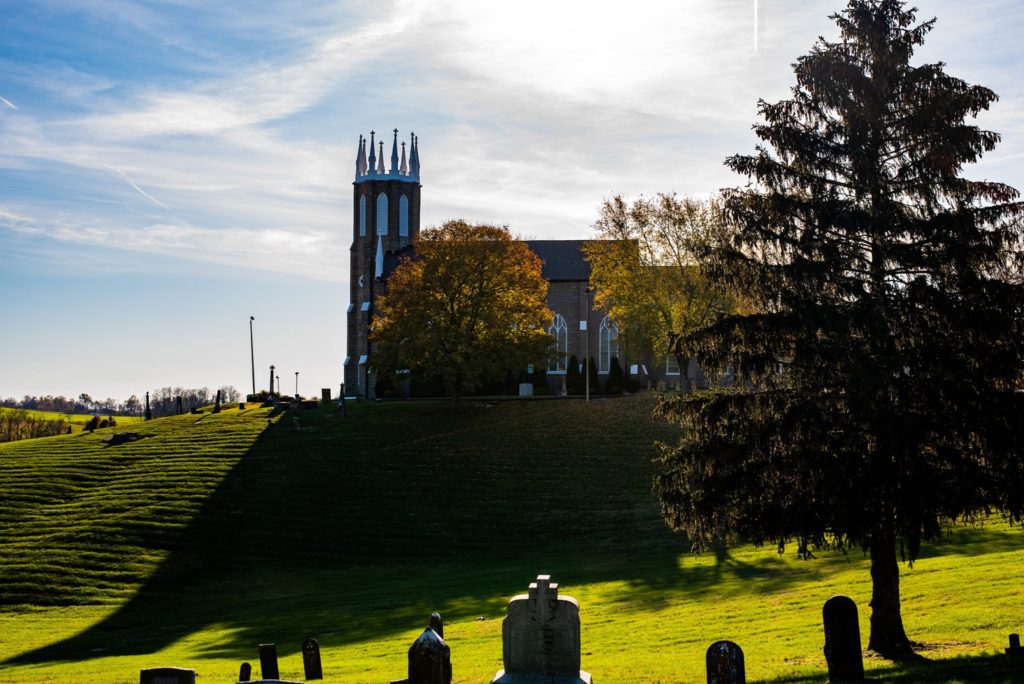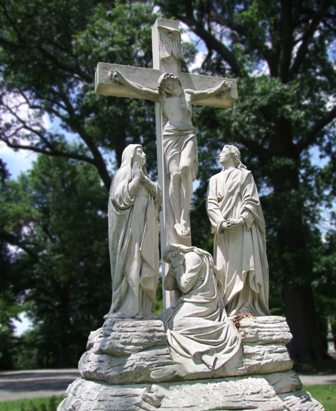November Month Of All Souls, Feast Of All Souls Day (Nov. 2)
The month of November all masses are dedicated to the Souls in Purgatory, especially those whose names have been placed on the altar.
Send names to be placed on the altar of Our Lady of Mount Carmel Boston Kentucky to:
marcosandolini333@yahoo.com
ourladyofmtcarmelusa@gmail.com
On the first of November, the Church celebrates the Solemnity of All Saints, a Holy Day of Obligation, honoring all those faithful in heaven, the known and unknown Saints. November 2nd is the Commemoration of All the Faithful Departed, also known as All Souls Day, a day set aside to pray for all the dead. All Souls Day begins the Church’s focus on praying for the Faithful Departed throughout November. The need and duty of prayer for the dead has been acknowledged by the Church. It is recommended in the Scriptures of the Old Testament: “It is, therefore, a holy and wholesome thought to pray for the dead, that they may be loosed from sins.”(2 Macc. 12:46). This duty is expressed in public and private prayers but especially in the offering of the Holy Sacrifice of the Mass for the repose of souls.
The prayers are particularly directed for the souls who are being purified in Purgatory, waiting for the day when they will join the saints in heaven. The celebration of Mass is the highest means the Church can provide for charity for the dead, but we can also relieve their sufferings through our prayers, sufferings, and penances. We can particularly help the Poor Souls by doing acts and prayers that have indulgences attached to them.
Indulgenced Acts for the Faithful Departed
There are many indulgences, applicable only to the Souls in Purgatory, that can be obtained during the month of November.
From the Enchiridion of Indulgences:
1. A plenary indulgence, applicable only to the souls in purgatory, is granted to the faithful who, on any and each day from November 1 to 8, devoutly visit a cemetery and pray, if only mentally, for the departed; on All Souls’ Day (or, according to the judgement of the ordinary, on the Sunday preceding or following it, or on the solemnity of All Saints), devoutly visit a church or an oratory and recite an Our Father and the Creed.
2. A partial indulgence, applicable only to the souls in purgatory, is granted to the faithful who, devoutly visit a cemetery and at least mentally pray for the dead; devoutly recite lauds or vespers from the Office of the Dead or the prayer Requiem aeternam (Eternal Rest). Incorporating Indulgences Acts through November and the Year.
A partial indulgence can be obtained by devoutly visiting a cemetery and praying for the departed, even if the prayer is only mental. There are a few cemeteries that have car paths, allowing one to “visit” even if you stay in the car.
The “Eternal Rest” prayer gains a partial indulgence and can be prayed all year. Passing a cemetery and praying the “Eternal Rest” can help out the souls in need.
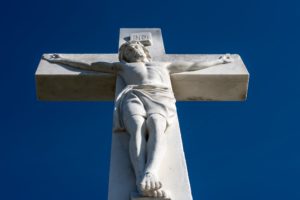
How to Gain an Indulgence
An indulgence is “the remission before God of the temporal punishment due for sins already forgiven as far as their guilt is concerned, which the follower of Christ with the proper dispositions and under certain determined conditions acquires through the intervention of the Church which, as minister of the Redemption, authoritatively dispenses and applies the treasury of the satisfaction won by Christ and the saints. An indulgence is partial or plenary according as it removes either part or all of the temporal punishment due sin”(Indulgentiarum Doctrina, n.1-2).
To obtain this remission there are proper dispositions and certain conditions predetermined by the Church that must be met. Firstly, one must have the intention to gain the indulgence, and perform the works at the time and in the manner prescribed.
To gain a Plenary Indulgence (only one per day), the faithful must be in the state of grace and the following conditions must accompany the prescribed act:
1. have the interior disposition of complete detachment from sin, even venial sin;
2. receive the sacrament of confession
3. receive the Holy Eucharist (it is certainly better to receive it while participating in Holy Mass, but for the indulgence only Holy Communion is required)
4. and recite the prayers for the intentions of the Holy Father (one Our Father and one Hail Mary is suggested as a minimum, but any other additional prayers may be added).
All attachment to sin, even venial sin, must be absent. If one’s disposition is less than perfect or if some of the above conditions are not fulfilled, the indulgence becomes partial. More details about the timing of these requirements: It is appropriate, but not necessary, that the sacramental Confession and especially Holy Communion the prayer for the Pope’s intentions take place on the same day that the indulgence work is performed; but it is sufficient that these sacred rites and prayers be carried out within several days (about 20) before or after the indulgenced act. Prayer for the Pope’s intentions is left to the choice of the faithful, but an “Our Father” and a “Hail Mary” are suggested. One sacramental Confession suffices for several plenary indulgences, but a separate Holy Communion and a separate prayer for the Holy Father’s intentions are required for each plenary indulgence.
*************************************
Grant #29.1.1
For the Souls in Purgatory
Plenary Indulgence
A plenary indulgence, applicable only to the souls in purgatory, is granted each and every day from Nov 1 to Nov 8, who devoutly visit a cemetery and there pray, if only mentally, for the departed.
Grant #29.12
All Souls’ Day – Plenary Indulgence
A plenary indulgence is granted the faithful who, on All Souls’ Day or on the solemnity of All Saints devoutly visits a church or an oratory and recites an Our Father and the Creed.
Requirements for obtaining a plenary indulgence:
Do the work while in a state of grace,
Receive Sacramental confession within 8 days before or after the work (several plenary indulgences may be earned per reception),
-Receive Holy Communion within 8 days before or after the work (one plenary indulgence may be earned per reception),
-Pray for pope’s intentions (Our Father and Hail Mary, or other appropriate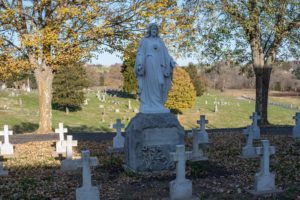 prayer, is sufficient),
prayer, is sufficient),
-Have no attachment to sin (even venial) -i.e., it is sufficient that the Christian makes an act of the will to love God and despise sin.
Requirements for a partial indulgence: The work must be done while in a state of grace and with the general intention of earning an indulgence.
-Only baptized persons in a state of grace who generally intend to do so may earn indulgences.
-Indulgences cannot be applied to the living but only to the one doing the work or to the dead.
-Only one plenary indulgence per day can be earned (except for the prayer at the hour of one’s own death).
-Several partial indulgences can be earned during the same day.
-If only part of a work with plenary indulgence attached is completed, a partial indulgence still obtains.
-If the penance assigned in confession has indulgences attached the one work can satisfy both penance and indulgence.
-Confessors may commute the work or the conditions if the penitent cannot perform them due to legitimate obstacles.
-In groups, indulgenced prayer must be recited by at least one member while the others at least mentally follow the prayer.
-If speech/hearing impairments make recitation impossible, mental expression or reading of the prayer is sufficient.
-For an indulgence attached to a particular day requiring a church visit, the day begins at noon the day before and ends at midnight.
The Eternal Rest
Eternal rest grant to them, O Lord, and let perpetual lights shine upon them.
May the Souls of the faithful departed, through the mercy of God, rest in peace. Amen.
The “Eternal Rest” prayer can be inserted in between decades of the rosary, and can be added to the end of the “Prayer Before Meals”:
Bless us, O Lord, and these thy gifts,
Which we are about to receive,
from Thy bounty,
through Christ, our Lord, Amen.
And may the souls of the faithful departed,
through the mercy of God,
rest in peace. Amen.
The Our Father
Our Father, Who art in Heaven, hallowed be Thy name; Thy kingdom come; Thy will be done on earth as it is in Heaven. Give us this day our daily bread; and forgive us our trespasses as we forgive those who trespass against us: and lead us not into temptation, but deliver us from evil. Amen.
Hail Mary
Hail Mary, full of Grace, the Lord is with thee. Blessed art thou amongst women, and blessed is the Fruit of thy womb, Jesus. Holy Mary, mother of God, pray for us sinners, now and in the hour of our death. Amen
“The dead are aided by alms, by the prayers of the Church and by the Sacrifice of the Mass.” (Saint Augustine)
[From the Book of Saint Augustine on ‘Duties Toward the Dead’]
The arrangements for the burial, the preparation of the tomb, the funeral procession are rather a solace for the living than a help to the dead. But that is no reason for neglecting or abandoning the bodies of the dead, especially those of good and faithful persons- a body which the spirit used as an instument and vessel for all good works. For if a father’s clothing and ring or anything of the kind is dear to his children because of their affection for their parents, their bodies are not to be disregarded,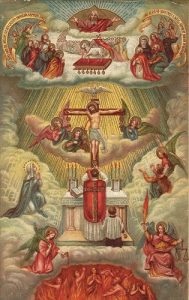 which were closer and more one with them than any clothing. For these are not some ornament or instrument that is added from without; they belong to the very nature of man. And for this reason the funerals of the just men of old were carried out with dutiful piety, their burials celebrated and tombs provided; and they themselves, while they were alive, gave commands to their children as to the bural and even the later transferral of their bodies.
which were closer and more one with them than any clothing. For these are not some ornament or instrument that is added from without; they belong to the very nature of man. And for this reason the funerals of the just men of old were carried out with dutiful piety, their burials celebrated and tombs provided; and they themselves, while they were alive, gave commands to their children as to the bural and even the later transferral of their bodies.
A love marked by remembrance and prayer is shown toward the departed by the faithful who were most dear to them. There can be no doubt that such a love profits those who in their earthly lifetime proved worthy of receiving it after death. Even if some necessity makes it impossible to bury a body, or to bury it in a holy place, still supplication for the spirit of the dead person are not to be omitted. After the Church undertakes to offer these supplications in a general commemoration for all who die in the Christian and Catholic fellowship, even though their names are not mentioned, so that those who lack parents or children or relatives or friends may have these prayers provided for them by the loving Mother of all (Holy Roman Catholic Church). Actually, in the absence of such prayers, offered for the dead with true faith and piety, I think there would be no advantage to their souls in having their soul-less bodies buried in consecrated ground. Since this is so, we should not think that anything reaches the dead whom we care for, except what we solemnly ask for them by the Holy Sacrifice of the Altar or by prayer or almsgiving. In fact these do not benefit all those for whom they are made, only those whose lives were such that they are prepared to be benefited by them. But because

we cannot tell who these may be, we should do these things for all the baptized, so that none be left out whom these benefits could and should reach. For it is better that they be superfluous for those whom they can neither hinder nor help than that they should be lacking to those whom they would help. But each person does these things very diligently for his relatives and friends, in expectation of a similar remembrance from the relatives and friends who will survive him. What is done as to burying the body is not an aid to salvation, but rather a duty of humanity, prompted by the love according to which “no one hates his own flesh.” And so it is fitting that each man care for the body of his neighbor as best he can, when the neighbor has gone where he cannot care for himself. If those who do not believe in the resurrection of the body do these things, how much more should those carry them out who do believe. Carrying out this office for a dead body which is to rise and live forever is a kind of witness to faith in the resurrection.
